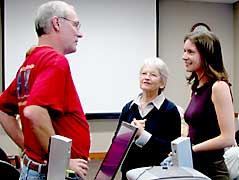 At left, Gene Davison, new chairperson of the Peace Network of the Ozarks, chats with Anna Baltzer before her lecture. Joan Collins, PNO member and long-time peace activist listens in.
At left, Gene Davison, new chairperson of the Peace Network of the Ozarks, chats with Anna Baltzer before her lecture. Joan Collins, PNO member and long-time peace activist listens in.
A guest of Peace Network of the Ozarks, Anna Baltzer would refute Martin Wasserman's opinion. She spoke to an audience of about 40 yesterday at the Library Station in Springfield. Her topic dealt with life in occupied Palestine, reflecting information from her book Witness in Palestine that she was promoting during an extensive cross country book tour nearing its end. Baltzer, 26, who made it clear that she was relaying her own opinion based upon a 5-month visit to Palestine, has the distinction of being one of more than 7,000 people on masada2000.org's Self-Hating and/or Israel-Threatening (SHIT) List. To earn a spot on this list, a Jewish person has to turn a blind eye to Arab terrorism and, as in her case, focus entirely on the plight of those living in occupied Palestine.
Several groans from the audience suggested that she was making her point about the oppression of the Palestinians by the Israelis, especially when she showed without comment a picture of razorwire topping a fence at an Israeli checkpoint. She went into great detail regarding the methods she believed the Israelis were using to thwart the passage of Palestinian refugees--special colored license plates to easily spot their vehicles, permits to travel on Israeli roads, hundreds of "flying" checkpoints between Palestinian towns and villages and the 25' high wall that the Israelis were building in an erratic snaking fashion that in the case of a family she knew separated their house from the rest of the community or of others from their land.
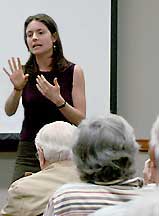
Her emotion ran high as she detailed how it might take a Palestinian 2, 4, 8 hours or, perhaps, an entire day to travel 30 miles because of the need to stop at checkpoints, and when she thought about its limiting effects on job security and higher education, she threw in the term "we" placing herself in their shoes.
Although she recognizes the argument that Palestinians are not willing to compromise, she asked "how long can people live like this before resisting?"
In describing a checkpoint at Nablus. she told how men 15-40 generally were prohibited from passing through and that Israeli soldiers, whom she said were "just following orders," had suggested to two men that they fill up bags with trash before they would consider their passage. She followed this anecdote with the story of a woman 7-months pregnant with premature labor pains who was held at a checkpoint until her husband could get a government official to pass the O.K. to the soldier holding them back and how her babies died without immediate hospital care as did a total of 140 Palestinians within ambulances.
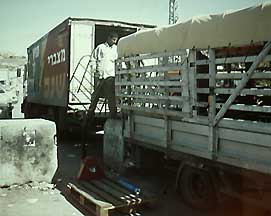 In describing how checkpoints are debilitating to the Palestinian economy, Baltzer showed a picture of how the contents of one truck at one side of an impassable checkpoint had to be passed along to the truck waiting on the opposite side. The picture appears to show a Palestinian-owned truck passing goods to an Israeli truck.
In describing how checkpoints are debilitating to the Palestinian economy, Baltzer showed a picture of how the contents of one truck at one side of an impassable checkpoint had to be passed along to the truck waiting on the opposite side. The picture appears to show a Palestinian-owned truck passing goods to an Israeli truck.
What was the reason for citing these anecdotes? She said that just like at the Nurenberg Trials where "I was just following orders" was an insufficient excuse for committing atrocities, here, too, people had to be responsible for their own actions.
In dealing with the security and safety of the Israeli population, she asked "how much is about security and how much is about control?"
Aside from the issue of checkpoints and roadblocks, Baltzer protested the settlements which she described as "Jewish Israeli colonies on internationally-recognized Palestinian land and cited the Fourth Geneva Convention, Article 49, an international law prohibiting an occupied power from transferring citizens from their own territory to occupied territory. She gave examples of how many of these settlers committed armed aggression against the Palestinian villagers whom they hoped to displace.
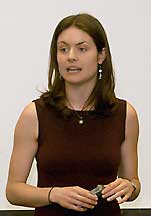
Although she gave several examples of non-violent protest--Palestinians simply staying in their homes, ladies attending an embroidery club meeting, a shepherdess back with her flock defending her right to graze where settlers' have moved in, painting and climbing atop the wall and prayer on Fridays--she rationalized an act of stone-throwing by a boy whose picture she snapped by saying his action was against the bulldozer that was destroying his land. She said 340 Palestinian children are being held in Israeli prisons or detention centers allegedly for throwing stones. Her picture show also included a parade of Palestinian women holding up pictures of their loved ones who were in prison; she said they had asked her to show the people of America their pictures.
While she said that many people may be afraid to speak out against the Israelis in order not to seem to be anti-Semitic, she believes that speaking out is in defense of human rights and international laws. She proposed to the audience that they contact their representatives and "tell them that the U.S. must stop giving American tax dollars to Israel...whether to build a Wall, to move more settlers in, or to conduct military operations."
Her talk ended with a slideshow of Palestinians of various ages, some interacting with Israeli soldiers, some simply waving flags. Although she made no comment about the people, most appeared to be well-dressed and not hungry.
Although one Jewish gentleman attempted to interrupt Baltzer's lecture in order to defend the Israelis for their actions, he was cut short by Gene Davison, chairperson of the PNO who considered the man's confrontation disrespectful to the speaker. During the question and answer period this man was either not recognized to speak or decided that his comments would fall on deaf ears.
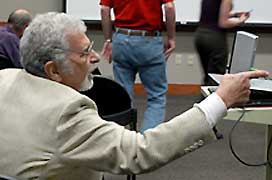
Taj Farouki of Springfield, an Arab who lived in Jaffa in 1948, believes that " Israel must make peace with the Arabs to survive." He told how his father's orange grove and mansion were taken over when the "British left cowardly in the middle of the night" and how the mansion was appropriated by the Weitzman Institute "for nuclear research".
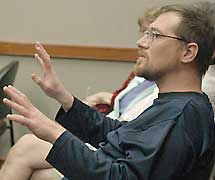
Joe Siegel of Springfield who said he was a member of the U.S. Army's Eighteenth Military Police Brigade based in the Sinai, accused Baltzer of presenting a very biased viewpoint based upon his experiences. Some of the points he made were that "checkpoints don't kill," that he has "seen children with suicide vests strapped on," and that "Israel's agreement with Egypt shows that Israel can be a peace partner". When he suggested that the Palestinians should "quit committing violence," he inspired the wrath of Farouki and the second intervention of Davison.
Ed Greenbank, who recently moved to Republic from Arizona, blames the ills of the world on the New World Order although he didn't make it clear how either the Palestinians or the Israelis would be impacted.
Jim Maudin, coordinator of the Springfield Library's Ethnic Life Stories Project, agreed with the dehumanizing effect of checkpoints. He believes that their purpose is "to get people to act violently so that they can be mowed down and decrease the population".
Many audience members quietly left without voicing their opinions although their faces suggested their distress.
PICTURES BY VINCE ROSATI






Comments